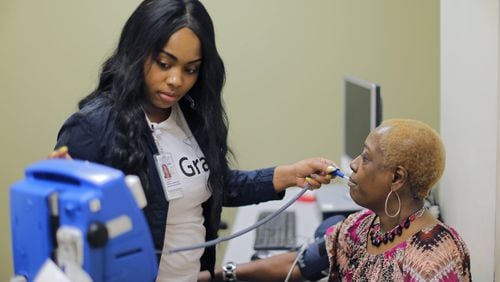Christy Nelson survived thyroid cancer but has been fighting insomnia for months, terrified of the GOP effort to dismantle the Affordable Care Act. She and her husband, who has Crohn’s disease, depend on protections for pre-existing conditions to afford health coverage, and following the collapse of the repeal effort their relief is only slowly starting to bloom. “We are a family scared to death,” she said. “This has been a terrible fear.”
Not Rodney Arnold of Acworth. He is disgusted. The 65-year-old Acworth resident wanted the Republicans to fulfill their promise to repeal and replace Obamacare. “I want to choose my own doctor,” Arnold said. “I want to choose my own insurance. I want to do what I want without government interference.”
Georgia patients, medical workers, hospital officials and taxpayers on all sides of the issue have lived with anxiety for months as Washington Republicans' tried to repeal the federal health care law known as Obamacare. They awoke in wonder Friday — those who didn't stay up to watch the dramatic moment on TV — to the news that it was over. At least for now.
Now, Georgia leaders must decide how to pick up the pieces in the state’s best interests. The state’s senators and representatives in Washington must decide whether to try again to replace the law or to work across party lines to improve the obvious flaws in the system that exists. President Trump and his administration can run the Obamacare system in ways that keep it afloat, or that poke more holes in its hull.
And the people it’s all about — the patients and taxpayers — are hoping those officials choose well.
“I’m a conservative,” said Arnold. “There’s ways of people meeting in the middle,” he said, and it’s time for that to happen. “People are getting fed up.”
Clearing the battlefield
Senators did not let the dust settle on the health bill before they skedaddled out of town for the weekend.
Many House Republicans were shell-shocked and livid that a central campaign pledge could be left flapping in the wind by a divided Senate.
“The House has done its job,” said U.S. Rep. Buddy Carter, R-Pooler. “What we sent to the Senate was a good bill, a very good bill. Sure, it’s going to need to be tweaked and massaged over the years, but it is a very good bill and we delivered on our promise from the House.”
Lawmakers appeared divided on the next steps. Top leaders aimed to move on to a tax overhaul. But other Republicans weren’t ready to give up. At least twice this year the repeal effort has been declared dead, they noted, only to rise again.
“Defeat is only ensured to those who surrender,” said Cassville Republican Barry Loudermilk.
The House is now gone for its five-week August recess, although Carter said some members of the Energy and Commerce Committee, which has jurisdiction over health care, may meet over the break to discuss potential paths forward. The Senate is expected to stick around for another week or two to work on other legislation before leaving for its own break.
In their victory lap following Friday morning’s vote, Democrats said that they were willing to work with Republicans as long as their opponents were willing to give up on repealing Obamacare. In spite of the defeat, that is still seen as an unlikely proposition.
Senate Democratic leader Chuck Schumer said during a press conference Friday that the two parties should first work to stabilize Obamacare’s exchanges and look to take care of people in counties where there are no longer any insurers operating on those exchanges.
“Nobody has said our health care system doesn’t need fixing,” Schumer said.
GOP lawmakers’ stances on the best approach forward varied. Some still said Democrats should help find an alternative to Obamacare.
“We have not gotten one single vote from a Democrat throughout this whole process, not one iota of help,” said Carter.
Tennessee Republican Lamar Alexander, a former governor with a deal-making reputation, is the chairman of the Senate health committee. He said he plans to hold hearings on ways to stabilize Obamacare’s markets.
“My main concern is doing all I can to help the 350,000 Tennesseans and 18 million Americans in the individual market who may literally have no options to purchase health insurance in 2018 and 2019,” Alexander said in a statement last week.
The human cost
In metro Atlanta, Paul Trau, 61, doesn’t like Obamacare. But he’s on one of its plans and he’d like it fixed. He said his insurance costs have increased significantly compared to what they were before the ACA.
“What we have now is not affordable,” he said.
To boot, his choice of doctors has narrowed. “I was forced out of every doctor that I used,” Trau said. “Before I could choose my carriers and choose my doctors.”
He summed it up: "I wound up with an insurance card with no insurance." And Trau is lucky. In the Atlanta area, he has a choice of insurers. But in 96 of Georgia's 159 counties, there is only one remaining insurer on the Obamacare exchange market, Blue Cross Blue Shield of Georgia. And in those areas, premiums are even more expensive.

Number of insurers in each county
1
2
3 or more
Source: Kaiser Family Foundation. (Saurabh Datar/AJC)

Number of insurers in each county
1
2
3 or more
Source: Kaiser Family Foundation. (Saurabh Datar/AJC)

Number of insurance providers in each county
1
2
3 or more
Source: Kaiser Family Foundation. (Saurabh Datar/AJC)
Medical prices are a huge issue for people on all sides of the health care debate. In a recent poll of the residents of Georgia’s sixth congressional district, respondents overwhelmingly said they were concerned.
The cost of drugs and all sorts of medical care are rising. And that helps drive up out-of-pocket costs whether the patient has old-fashioned company insurance, Obamacare, or something else.
The uncertainty over the future of Obamacare has also played a role in rising insurance rates. Blue Cross, for example, recently announced intentions to raise rates about 40 percent on the Obamacare exchange next year.
All that is bad news for people like Trau.
He is among those who believe the Republican effort to take down the law is dead. Now he wants to see the two political sides come together and work out improvements to the plan.
“There’s smart people on both sides of the aisle,” he said.
“Never over ‘til it’s over”
Health care researchers and activists in Georgia were wary but stunned. They said there are important decisions before Georgia leaders now.
“This outcome is a victory for Georgians in every corner of the state,” a patients’ advocacy group, Georgians for a Healthy Future, said in a notice to its members thanking them for fighting the “unconscionable cuts.”
“The passage of any of the debated proposals would have set Georgia’s health care system back 50 years and put significant strain on our state budget,” the statement said. But the fight’s not over, it added: Costs are too high and there’s not enough access to care.
One question likely to resurface is whether Georgia should expand Medicaid as the Obamacare law presumed it would. Georgia did not, and that left thousands of very poor Georgians without any health coverage. Hospitals and medical care providers often eat the cost of covering them. They say they’ve had it.
Grady Memorial Hospital would have been one of many of the state’s hospitals hurt by some of the repeal proposals. Most of the proposals would have curbed future Medicaid spending by hundreds of millions of dollars. Analysts said that was certain to lead to reductions in care.
In a statement, Grady subtly called out decisionmakers in Washington for being out of touch.
“The federal government should be improving its relationship with the states and providers, where healthcare is actually delivered to Americans,” the statement said. “The other missing piece in what Congress was doing — and this criticism applies to the Affordable Care Act too — is that it did not focus enough on the person receiving care and how we can work together to transform the delivery of care to reduce costs while simultaneously improving the quality and health outcomes for Americans.”
Kelly McCutchen of the libertarian-leaning Georgia Public Policy Foundation agrees cost and access to quality care are problems. But his first order of business for the state would be pursuing a waiver giving the state more flexibility in how it spends Medicaid dollars.
All the same, he wonders if there won’t be a reboot of repeal.
"Of course we're disappointed with what happened last night," McCutchen said Friday. "But it's never over til it's over. I wouldn't be surprised if after people go home and hear from their constituents something happens. There's a lot of anger out there and frustration."
One Georgia hospital consultant is skeptical of the path forward after the failure of the bare-bones “Skinny Repeal.”
“Wonder where they go now,” Chris Kane, a hospital consultant in Atlanta, wrote in an email. “‘Emaciated Repeal’ does not have the same ring.”
Work to be done
Mary Hall of Marietta blames the failure of the Republican repeal efforts on politics.
“Congress is full of weasels,” Hall said. “They have become so obsessed with winning and party. They have no concept of how the electorate is suffering.”
Hall is covered under her husband’s insurance. It keeps going up and up, she said.
“I fear we’re going to have to sell our house,” she said.
She believes that the federal government, in an effort to help the people who do not have health insurance, has jeopardized the rest of the population who already had it.
“We’ve compromised the entire system to help a small minority,” she said.
Jimmy Lewis understands Hall’s sentiment. He runs rural hospitals, in areas where insurance costs are even higher than in metro Atlanta. When they can’t pay, his hospitals take the hit.
And he knows things are about to get worse. Insurance companies have filed plans to raise rates next year. Blue Cross’s price hike on the Obamacare exchange plans will be difficult for many people to pay. Some will inevitably drop coverage.
Trump does not seem disposed to counter that. At 2:25 a.m. after the vote went down, he tweeted, “let ObamaCare implode, then deal. Watch!”
His Health and Human Services Secretary Tom Price of Georgia, can do much to either undercut or bolster the 2010 law.
Whereas the Obama campaign financed an extensive campaign to urge people to enroll in the exchanges, Price’s Department of Health and Human Services has pulled much of that. It has recently used taxpayer money to record videos criticizing the law and held events with “victims” of Obamacare.
Trump has threatened to stop paying subsidies critical to lowering out-of-pocket costs to lower-income policyholders.
Lewis does not believe the Republican plans that failed were going to address the core issues. He stayed up to the early morning hours Friday to see the vote happen live on television. He was glad, and still anxious.
“My reaction is, it’s kind of like having a great big smile on my face,” he said, “after I slammed my car door on my thumb.”
Forty miles south of Lewis, the Right Reverend Robert Wright, Episcopal bishop of the diocese of Atlanta, learned the news of the vote hours after Lewis when he opened his morning paper. Dealing with parishioners of every economic and lifestyle stripe, he said, was deeply concerned about the bills, but like Lewis, he’s still worried.
"I'm glad we did not take away 16 million Americans' health care," Wright said. "But now we are sort of waiting on the ACA to fail as it is; I don't think that's the right attitude either.
“I’m hoping some people take this as a call to action. We know we have to do bipartisan work.”









